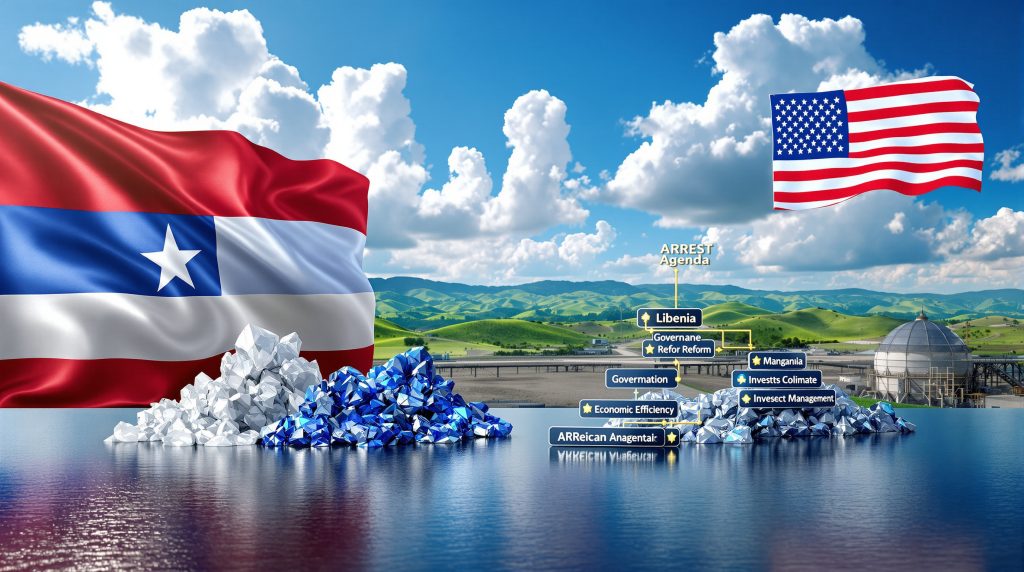What Triggered Liberia's Sudden Mining Leadership Overhaul?
President Joseph Boakai's administration executed a strategic personnel restructuring within Liberia's mining sector, appointing R. Matenokay Tingban as the new Minister of Mines and Energy while simultaneously replacing the head of the National Mining Regulatory Agency. This dual leadership transition represents a calculated move to optimise governance effectiveness and strengthen international investor relations during a pivotal period for the nation's resource development strategy.
The timing coincides with intensifying discussions between Liberian officials and U.S. representatives regarding potential investments in the country's recently identified critical mineral deposits, including lithium, cobalt, manganese, and rare earth elements essential for renewable energy technologies and electric vehicle manufacturing. Furthermore, these changes align with broader mining industry evolution trends across Africa.
Background of the New Mining Minister
R. Matenokay Tingban brings substantial governmental experience to the role, having previously served as deputy mining minister during Ellen Johnson Sirleaf's presidency and as a legislative representative from Nimba County. His appointment signals continuity with established mining policies while introducing fresh leadership perspectives to navigate contemporary challenges in global resource markets.
The transition from Wilmot J.M. Paye to Tingban reflects the administration's commitment to implementing governance improvements without disrupting ongoing critical mineral exploration initiatives that have attracted significant international attention. However, successful implementation requires understanding mining permitting insights to navigate regulatory complexities effectively.
How Do These Changes Align With Liberia's Economic Development Strategy?
The ministerial restructuring forms a cornerstone of President Boakai's "ARREST Agenda" – a comprehensive five-year national development framework designed to enhance governance standards, operational efficiency, and international investment attractiveness across key economic sectors.
Core Objectives of the ARREST Agenda
| Priority Area | Implementation Focus | Expected Outcomes |
|---|---|---|
| Governance Reform | Institutional strengthening | Enhanced transparency |
| Economic Efficiency | Streamlined regulatory processes | Faster project approvals |
| Investment Climate | International partnership development | Increased foreign capital |
| Resource Management | Sustainable extraction practices | Long-term revenue generation |
This strategic approach positions Liberia to capitalise on growing global demand for critical minerals whilst establishing robust frameworks for responsible resource development and environmental stewardship. The Senate confirmation requirements for several appointments demonstrate institutional commitment to democratic oversight and accountability. Additionally, successful implementation depends on well-structured investment strategy components guiding resource allocation decisions.
What Role Does U.S. Investment Play in Liberia's Mining Future?
High-level diplomatic engagement between Liberian and American officials has intensified significantly, with U.S. Secretary of State Marco Rubio conducting strategic meetings with Foreign Minister Sara Beysolow Nyanti in Washington on October 17. These discussions specifically target expanded American participation in Liberia's critical minerals sector, reflecting broader U.S. strategic interests in diversifying supply chains for essential materials.
Furthermore, recent policy developments indicate strengthening bilateral cooperation. Moreover, these initiatives complement US mining policy actions aimed at securing domestic supply chains.
Strategic Importance of Critical Minerals
The discovered mineral deposits in Liberia replaces mines minister amid U.S. investment talks context include:
-
Lithium: Essential for battery manufacturing and energy storage systems
-
Cobalt: Critical component in electric vehicle batteries and renewable energy infrastructure
-
Manganese: Vital for steel production and battery technologies
-
Rare Earth Elements: Indispensable for advanced electronics and green technology applications
These resources position Liberia as a potentially significant player in global supply chains supporting the energy transition, particularly as nations seek to reduce dependence on concentrated mineral sources. The timing of leadership changes suggests preparation for accelerated development timelines driven by international demand.
Which Companies Currently Operate in Liberia's Mining Sector?
Liberia's mining landscape features a diverse mix of international operators, with iron ore remaining the dominant export commodity alongside emerging gold production that has become increasingly important for foreign exchange earnings.
Major Mining Operations and Stakeholders
Current Industry Leaders:
-
ArcelorMittal: Operates the largest mine and rail network infrastructure
-
Ivanhoe: Active in mineral exploration and development
-
Bea Mountain (Avesoro): Gold mining operations
-
MNG Gold: Precious metals extraction
-
Hummingbird Resources: Multi-commodity mining activities
These established operations provide a foundation for sector growth whilst new critical mineral discoveries offer opportunities for expanded international investment and technological advancement in extraction methodologies. The existing infrastructure, particularly ArcelorMittal's rail network, provides crucial logistics capabilities for future mineral transport.
How Does This Leadership Change Impact Regional Mining Dynamics?
The situation where Liberia replaces mines minister amid U.S. investment talks occurs within a broader West African context where multiple nations are actively courting foreign investment to develop their mineral resources. The region has become increasingly strategic for global powers seeking to secure reliable access to critical materials essential for technological advancement and energy transition initiatives.
Regional Competition and Cooperation
The leadership changes position Liberia to compete more effectively with neighbouring countries for international investment whilst potentially fostering regional cooperation in:
-
Infrastructure development and shared transportation corridors
-
Regulatory harmonisation across mineral-rich nations
-
Sustainable mining practices that benefit the entire West African mining corridor
-
Technology transfer and skills development programmes
In addition, establishing a critical raw materials facility could enhance regional competitiveness. The appointment of experienced leadership suggests preparation for increased competition with established mining jurisdictions whilst maintaining cooperative relationships with regional partners.
What Governance Improvements Are Expected Under New Leadership?
The appointment process demonstrates institutional commitment to transparency, with several positions requiring Senate confirmation to ensure democratic oversight of key mining sector appointments. This approach reflects broader efforts to strengthen institutional frameworks and restore international confidence in Liberia's governance systems.
Institutional Strengthening Measures
-
Enhanced Regulatory Oversight: Improved monitoring and compliance systems for mining operations
-
Transparent Appointment Processes: Democratic validation of key positions through legislative review
-
International Standards Alignment: Adoption of global best practices in mining regulation
-
Stakeholder Engagement: Expanded consultation with industry representatives and local communities
The dual replacement of both the mining minister and regulatory head signals comprehensive reform rather than isolated personnel changes, suggesting systematic improvements across the sector's governance structure. Consequently, these measures should strengthen investor confidence and operational transparency.
How Might These Changes Affect Future Investment Opportunities?
The strategic personnel changes, combined with intensified U.S. engagement, create favourable conditions for expanded foreign investment in Liberia's mining sector. The focus on critical minerals aligns with global market trends and supply chain diversification strategies pursued by major economies seeking alternatives to concentrated supply sources.
Investment Climate Enhancements
Potential improvements include:
-
Streamlined Permitting: Faster processing of exploration and development licenses
-
Enhanced Regulatory Predictability: Clearer guidelines and consistent policy implementation
-
Strengthened Environmental Standards: Sustainable development protocols meeting international expectations
-
Expanded Infrastructure Development: Support for large-scale mining operations and export capabilities
The ministerial changes occur as global demand for battery metals continues expanding, creating market conditions favourable for new project development and international partnership formation. However, success requires careful consideration of regulatory frameworks and market dynamics.
What Technical Factors Drive Critical Mineral Development?
Understanding Liberia's mineral potential requires examination of geological characteristics that differentiate deposits from established mining regions. The country's Precambrian geological formations contain mineralisation patterns similar to other successful African mining jurisdictions, though specific grade and tonnage data remain under evaluation through ongoing exploration programmes.
Geological Advantages and Challenges
| Factor | Advantage | Development Challenge |
|---|---|---|
| Geological Setting | Proven mineral-bearing formations | Infrastructure requirements |
| Deposit Types | Multiple commodity potential | Technical extraction complexity |
| Location | Atlantic coast access | Rural development needs |
| Regulatory Environment | Evolving frameworks | International standard alignment |
The technical aspects of critical mineral extraction require specialised processing capabilities and environmental management systems that differ significantly from traditional iron ore operations. New leadership must navigate these technical requirements whilst maintaining operational efficiency.
What Are the Long-term Implications for Liberia's Economic Development?
Successfully developing critical mineral resources could transform Liberia's economic trajectory, providing substantial government revenues, employment opportunities, and infrastructure development that benefits multiple sectors beyond mining. The strategic approach emphasises sustainable development practices that balance economic growth with environmental protection and community welfare.
Economic Transformation Potential
The ministerial changes represent preparation for economic diversification beyond traditional iron ore exports, which have historically dominated Liberia's mining sector. Critical mineral development offers opportunities for:
-
Higher-value commodity exports generating increased government revenues
-
Technology transfer through partnerships with international mining companies
-
Skills development in specialised mining and processing techniques
-
Infrastructure expansion supporting broader economic development
The leadership transition signals institutional readiness for managing more complex mining operations requiring advanced technical capabilities and international regulatory compliance. For instance, these developments could significantly impact regional supply chain dynamics.
How Do Market Psychology and Investment Sentiment Influence Development?
Investor confidence in frontier mining jurisdictions depends heavily on political stability and regulatory predictability. The strategic nature of the leadership changes, rather than reactive appointments, demonstrates proactive governance that international mining companies typically view favourably when evaluating investment opportunities.
Investment Decision Factors
Mining companies evaluating Liberian opportunities consider multiple risk factors:
-
Political continuity: Consistent policy implementation across administration changes
-
Regulatory clarity: Transparent licensing and operational requirements
-
Infrastructure availability: Transportation and power supply accessibility
-
Community relations: Social licence to operate and stakeholder engagement
The ministerial appointments address several of these concerns by installing experienced leadership with established track records in mining sector management and international engagement. Moreover, industry analysis suggests positive market reception to these developments.
Disclaimer: This analysis involves forecasts and speculation regarding future mining development and investment outcomes. Actual results may vary based on market conditions, regulatory changes, and geological discoveries. Investment decisions should be based on comprehensive due diligence and professional consultation.
The event where Liberia replaces mines minister amid U.S. investment talks represents more than administrative adjustments – it signals Liberia's commitment to positioning itself as a reliable partner in global critical mineral supply chains whilst maintaining sovereignty over its natural resources and development priorities. The strategic timing and experienced appointments suggest preparation for accelerated sector development driven by international demand and partnership opportunities.
Ready to Capitalise on Global Mining Sector Developments?
Discovery Alert's proprietary Discovery IQ model delivers real-time notifications on significant ASX mineral discoveries, helping investors identify actionable opportunities as global mining dynamics shift and new partnerships emerge. Begin your 30-day free trial today to gain immediate access to AI-powered insights that could position you ahead of the market in this rapidly evolving sector.




